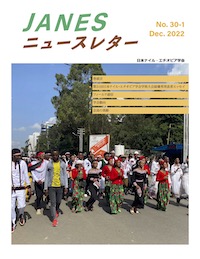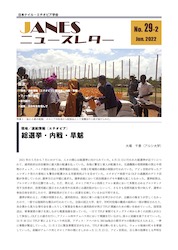第32回日本ナイル・エチオピア学会学術大会の第2次サーキュラーをお送りします。第32回学術大会は、大阪公立大学中百舌鳥キャンパス(大阪府堺市)にてハイブリッド方式で開催予定です。
The 32nd Annual Conference of the Japan Association for Nilo-Ethiopian studies (JANES) will be held on April 15 and 16, 2023. It is scheduled to be held at Nakamozu Campus, Osaka Metropolitan University, by hybrid method of in-Person and Online.
サーキュラーのダウンロード/Download 2nd Circular
第32回JANES学術大会第2次サーキュラー(日本語・再修正版)
2nd Circular for 32nd JANES Conference (English)
開催方法について
対面およびオンラインのハイブリッド方式の開催を予定しています。
参加•発表の申し込みには、本文中の<参加フォーム>をご利用下さい。会員のみなさまの積極的なご参加とご協力をお願い申し上げます。
1.大会概要
【会期】2023年4月15日(土)〜16日(日)
【Session】 April 15 (Sat) to 16 (Sun), 2023
【会場】大阪公立大学中百舌鳥キャンパス 大阪府堺市中区学園町1-1
【Venue】 Nakamozu Campus, Osaka Metropolitan University 1-1 Gakuen-cho, Naka-ku, Sakai, Osaka
アクセスマップ/Access:https://www.omu.ac.jp/about/campus/nakamozu/
(オンライン(ZOOM)の場合)
参加にはZoomに接続するためのパソコンやタブレット等のインターネット端末、安定してインターネットに接続できる環境が必要になります(発表者の場合、マイク内蔵型のPCではない場合は外付マイクも必要です)。
【スケジュール】
2023年4月15日(土)評議員会、公開シンポジウム
April 15, 2023 (Sat) The Board of Trustees meeting, Public Symposium
4月16日(日)研究発表、総会
April 16, 2023 (Sun) Individual presentation, The General Assembly
2.運営幹事会・評議員会・総会スケジュール
【運営幹事会/Board of Secretaries】2023年4月14日(金)16時30分〜18時30分
【評議員会/Board of Trustees】 2023年4月15日(土)11時30分〜12時30分
【総会/General Assembly】 2023年4月16日(日)午後
*運営幹事会、評議員会ともハイブリッド形式で行います。


